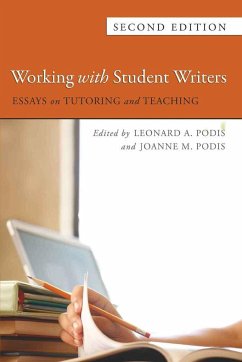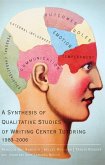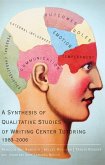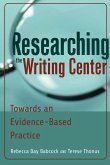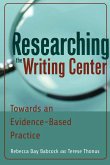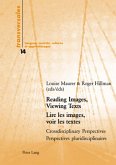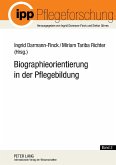Working with Student Writers
Essays on Tutoring and Teaching
Herausgegeben:Podis, JoAnne M.; Podis, Leonard
Working with Student Writers
Essays on Tutoring and Teaching
Herausgegeben:Podis, JoAnne M.; Podis, Leonard
- Broschiertes Buch
- Merkliste
- Auf die Merkliste
- Bewerten Bewerten
- Teilen
- Produkt teilen
- Produkterinnerung
- Produkterinnerung
This revised, expanded collection provides practical and theoretical knowledge for undergraduate writing associates and graduate teaching assistants. Unlike similar collections, this volume is comprised largely of pieces authored by tutors themselves, offering hands-on advice for current classmates and future tutors; thus the volume highlights specific issues that arise when writing associates and novice teachers actually attempt to practice their craft. When used in pedagogy courses, the essays can serve both as sources of instruction about tutoring and teaching and as models for students'…mehr
Andere Kunden interessierten sich auch für
![A Synthesis of Qualitative Studies of Writing Center Tutoring, 1983-2006 A Synthesis of Qualitative Studies of Writing Center Tutoring, 1983-2006]() Rebecca Day BabcockA Synthesis of Qualitative Studies of Writing Center Tutoring, 1983-2006147,80 €
Rebecca Day BabcockA Synthesis of Qualitative Studies of Writing Center Tutoring, 1983-2006147,80 €![A Synthesis of Qualitative Studies of Writing Center Tutoring, 1983-2006 A Synthesis of Qualitative Studies of Writing Center Tutoring, 1983-2006]() Rebecca Day BabcockA Synthesis of Qualitative Studies of Writing Center Tutoring, 1983-200641,85 €
Rebecca Day BabcockA Synthesis of Qualitative Studies of Writing Center Tutoring, 1983-200641,85 €![Researching the Writing Center Researching the Writing Center]() Rebecca Day BabcockResearching the Writing Center147,80 €
Rebecca Day BabcockResearching the Writing Center147,80 €![Researching the Writing Center Researching the Writing Center]() Terese ThonusResearching the Writing Center43,10 €
Terese ThonusResearching the Writing Center43,10 €![Reading Images, Viewing Texts- Lire les images, voir les textes Reading Images, Viewing Texts- Lire les images, voir les textes]() Reading Images, Viewing Texts- Lire les images, voir les textes72,90 €
Reading Images, Viewing Texts- Lire les images, voir les textes72,90 €![Going Inward Going Inward]() Going Inward166,10 €
Going Inward166,10 €![Biographieorientierung in der Pflegebildung Biographieorientierung in der Pflegebildung]() Biographieorientierung in der Pflegebildung57,75 €
Biographieorientierung in der Pflegebildung57,75 €-
-
-
This revised, expanded collection provides practical and theoretical knowledge for undergraduate writing associates and graduate teaching assistants. Unlike similar collections, this volume is comprised largely of pieces authored by tutors themselves, offering hands-on advice for current classmates and future tutors; thus the volume highlights specific issues that arise when writing associates and novice teachers actually attempt to practice their craft. When used in pedagogy courses, the essays can serve both as sources of instruction about tutoring and teaching and as models for students' own course papers. This edition incorporates fifteen new essays to complement the best selections from the first edition.
Produktdetails
- Produktdetails
- Verlag: Peter Lang
- Artikelnr. des Verlages: 310710
- 2., überarb. Aufl.
- Seitenzahl: 408
- Erscheinungstermin: 28. Dezember 2009
- Englisch
- Abmessung: 225mm x 150mm x 23mm
- Gewicht: 570g
- ISBN-13: 9781433107108
- ISBN-10: 1433107104
- Artikelnr.: 28244259
- Herstellerkennzeichnung
- Libri GmbH
- Europaallee 1
- 36244 Bad Hersfeld
- gpsr@libri.de
- Verlag: Peter Lang
- Artikelnr. des Verlages: 310710
- 2., überarb. Aufl.
- Seitenzahl: 408
- Erscheinungstermin: 28. Dezember 2009
- Englisch
- Abmessung: 225mm x 150mm x 23mm
- Gewicht: 570g
- ISBN-13: 9781433107108
- ISBN-10: 1433107104
- Artikelnr.: 28244259
- Herstellerkennzeichnung
- Libri GmbH
- Europaallee 1
- 36244 Bad Hersfeld
- gpsr@libri.de
The Editors: Leonard A. Podis is Professor of Rhetoric and Composition and English at Oberlin College. JoAnne M. Podis is Vice President for Academic Affairs and Professor of English at Ursuline College. Longtime collaborators, they have published three books on writing and numerous scholarly articles in journals including College English, College Composition and Communication, and Rhetoric Review.
Contents: Katie Gilmartin: Working at the Drop-In Writing Center - Tisha Turk: «Tutoring» Beyond the Writing Center: Peer Consulting in the Classroom - Alicia Koundakjian: Speaking the Written Voice - Franchesca Medina: The Motives Behind Tutoring and Being Tutored - Peggy Putney: Working with Peers at the Writing Center: Tutoring for Diverse Disciplines - Jeremiah Dyehouse: Peer Tutors and Institutional Authority - Polly Dondy-Kaplan: Processing Writing - Emily Fawcett: «Like, it was, you know what I mean?»: Conversational vs. Presentational Speech in Student Academic Discourse - JoAnne M. Podis/Leonard A. Podis: Improving Our Responses to Student Writing: A Process-Oriented Approach - Naomi Strand: The Comments They Made: An Exploration of Helpful and Unhelpful Commentary - Noelle Howey: The Dilemmas of Grading - Leonard A. Podis: Perspectives on the Writing Classroom - Noelle Howey: No Answers: Interrogating «Truth» in Writing - Kate Daloz: Glazed Looks and Panic Attacks: Teaching Grammar to Basic Writers - Jenny Love: Learning from Writer's Block - Miriam Axel-Lute: Consciousness, Frustration, and Power: The Making of Contextual Writer's Block - Aaron Rester: The Hero with a Thousand Voices: The Relationship Between the Narrative and Academic Styles - Samantha Sansevere: On the Use of «I» in Academic Writing - Dinah Shepherd: Why Do We Write? - Melissa Hoskins: Demystifying the Discourse - JoAnne M. Podis: Authority Issues in Online Instruction - Aaron Miller: Internet Forums and the Writing Student - Elizabeth Weinstein: Writing in the Information Age: The Language of Email and Instant Messaging - Anita Stone: Scientific Writing: What's So Difficult About It Anyway? - Elizabeth Schambelan: Defining a Persona Within the Boundaries of Academic Discourse, or God, I Sound Like a Pretentious Ass - Holly Thompson: Traveling the Middle Ground: Bridging the Dichotomies Between Academic and Personal Discourse - Kanupriya Arora: Academic Papers Within the College Discourse - Emily Ryan: Attention Deficit Hyperactivity Disorder and the Writing Process - Maria E. Barajas-Román: Writing Beyond the Words: Language Minority Students and School Discourse - Emma Nolan-Thomas: Theory and Practice: Integrating ESL Scholarship and Peer Tutoring Pedagogy - Monica Bielski Boris: My Hidden Class Consciousness and the Impact of Socioeconomic Class in Academia - Virginia Pryor: Writing in Academia: The Politics of «Style» - Desirae Sweet: Rural Blue-Collar Identities and the Writing Process - Monica L. Davis: Caught Between Skin Color and Dialect: A Non-Essentialist View of Black English - Rebecca Phares/David Schwam: Writing Inside Out: Issues of Sexual Identity in the Writing Classroom - Lauren Podis: No Voice, No Vote: The Politics of Basic Writing - Grace Chang: Contextualizing the Debates: A Historical View of Expository Writing.
Contents: Katie Gilmartin: Working at the Drop-In Writing Center - Tisha Turk: «Tutoring» Beyond the Writing Center: Peer Consulting in the Classroom - Alicia Koundakjian: Speaking the Written Voice - Franchesca Medina: The Motives Behind Tutoring and Being Tutored - Peggy Putney: Working with Peers at the Writing Center: Tutoring for Diverse Disciplines - Jeremiah Dyehouse: Peer Tutors and Institutional Authority - Polly Dondy-Kaplan: Processing Writing - Emily Fawcett: «Like, it was, you know what I mean?»: Conversational vs. Presentational Speech in Student Academic Discourse - JoAnne M. Podis/Leonard A. Podis: Improving Our Responses to Student Writing: A Process-Oriented Approach - Naomi Strand: The Comments They Made: An Exploration of Helpful and Unhelpful Commentary - Noelle Howey: The Dilemmas of Grading - Leonard A. Podis: Perspectives on the Writing Classroom - Noelle Howey: No Answers: Interrogating «Truth» in Writing - Kate Daloz: Glazed Looks and Panic Attacks: Teaching Grammar to Basic Writers - Jenny Love: Learning from Writer's Block - Miriam Axel-Lute: Consciousness, Frustration, and Power: The Making of Contextual Writer's Block - Aaron Rester: The Hero with a Thousand Voices: The Relationship Between the Narrative and Academic Styles - Samantha Sansevere: On the Use of «I» in Academic Writing - Dinah Shepherd: Why Do We Write? - Melissa Hoskins: Demystifying the Discourse - JoAnne M. Podis: Authority Issues in Online Instruction - Aaron Miller: Internet Forums and the Writing Student - Elizabeth Weinstein: Writing in the Information Age: The Language of Email and Instant Messaging - Anita Stone: Scientific Writing: What's So Difficult About It Anyway? - Elizabeth Schambelan: Defining a Persona Within the Boundaries of Academic Discourse, or God, I Sound Like a Pretentious Ass - Holly Thompson: Traveling the Middle Ground: Bridging the Dichotomies Between Academic and Personal Discourse - Kanupriya Arora: Academic Papers Within the College Discourse - Emily Ryan: Attention Deficit Hyperactivity Disorder and the Writing Process - Maria E. Barajas-Román: Writing Beyond the Words: Language Minority Students and School Discourse - Emma Nolan-Thomas: Theory and Practice: Integrating ESL Scholarship and Peer Tutoring Pedagogy - Monica Bielski Boris: My Hidden Class Consciousness and the Impact of Socioeconomic Class in Academia - Virginia Pryor: Writing in Academia: The Politics of «Style» - Desirae Sweet: Rural Blue-Collar Identities and the Writing Process - Monica L. Davis: Caught Between Skin Color and Dialect: A Non-Essentialist View of Black English - Rebecca Phares/David Schwam: Writing Inside Out: Issues of Sexual Identity in the Writing Classroom - Lauren Podis: No Voice, No Vote: The Politics of Basic Writing - Grace Chang: Contextualizing the Debates: A Historical View of Expository Writing.

